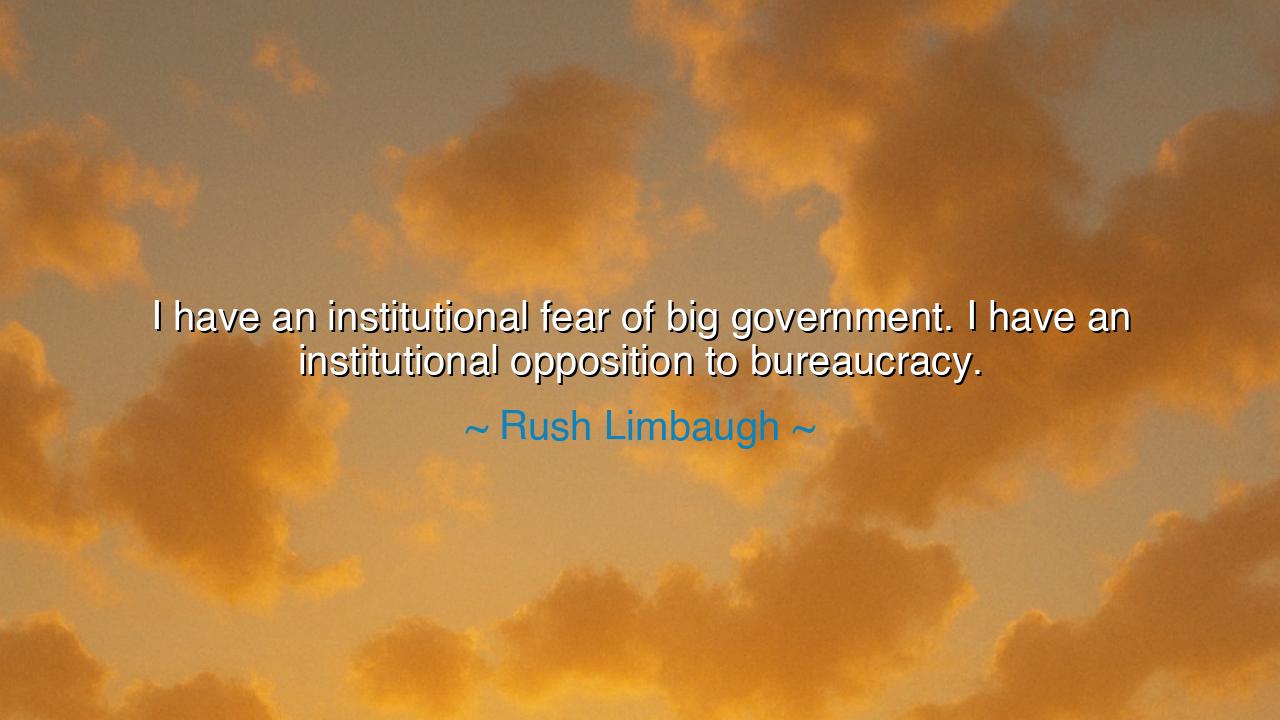
I have an institutional fear of big government. I have an
I have an institutional fear of big government. I have an institutional opposition to bureaucracy.






“I have an institutional fear of big government. I have an institutional opposition to bureaucracy.” Thus declared Rush Limbaugh, a man whose words rang with defiance against the creeping power of the state. His declaration is not born of rebellion alone, but of remembrance — the remembrance of what happens when liberty grows complacent, when the engines of authority turn not to serve the people, but to bind them. His was not a cry against order, but against excess, against the slow, suffocating tide of bureaucracy that drowns the flame of the human spirit beneath rules, regulations, and endless paper. It is a warning carved in the tone of the prophets: beware the might that grows too mighty, and the hand that reaches too far.
To understand this fear, we must first understand its root — the fear not of government itself, but of big government, that vast and unfeeling machine which, though born of noble intentions, grows into something cold and immense. It begins with promises: protection, fairness, equality. But as it grows, it demands tribute — not of gold, but of freedom. It builds systems to watch over the people, and soon those systems watch over everything. The bureaucracy, meant to serve, becomes a creature that serves itself. Each department a tower of procedure; each law a strand in a web that no man can escape. Thus arises the fear that Limbaugh names — not of the law, but of its overreach; not of order, but of its corruption into control.
History bears witness to this truth. Recall the fall of the once-great empires — Rome, whose republic died beneath the weight of its own administration; the Soviet Union, whose bureaucrats ruled with gray efficiency but no soul; even monarchies that crumbled beneath layers of officials who smothered the will of the people with decrees and stamps. Each believed itself wise, each built vast ministries to manage the lives of millions — and each, in time, collapsed beneath its own complexity. For no empire can live long when its citizens cease to be free thinkers and become instead mere subjects, submitting their will to the machinery of government.
Limbaugh’s opposition to bureaucracy is therefore a defense of the individual — that sacred spark within each person that resists being catalogued and controlled. Bureaucracy, he warned, does not see people; it sees numbers, cases, forms. It replaces human judgment with procedure, and passion with policy. In such a world, creativity withers, initiative fades, and the citizen becomes a cog. Against this, Limbaugh raised the banner of independence, echoing the ancient cry of the American founders: that the role of government is not to direct the people’s lives, but to protect their right to live them as they choose.
Consider the story of Ronald Reagan, another who shared this wariness of overgrown government. When he took office, America stood weary beneath the burden of inefficiency and regulation. Factories closed, taxes soared, and citizens felt trapped in the machinery of red tape. Reagan’s call — “Government is not the solution to our problem; government is the problem” — was not an attack on governance, but a plea for freedom from bureaucracy’s chokehold. By cutting through layers of regulation and trusting the power of the people, he rekindled a national spirit that had nearly dimmed. His leadership proved that when government loosens its grip, the people rise with renewed strength.
But Limbaugh’s warning remains relevant, for the temptation of control never sleeps. Every generation must guard against the growth of the unseen empire — the bureaucracy that expands quietly, invisibly, in the name of safety and order. What begins as a safeguard often becomes a shackle. When the state decides too much — what we may build, what we may say, how we may live — it is not tyranny in one blow, but tyranny by a thousand small permissions. Thus, the fear of big government is not paranoia; it is vigilance — the awareness that freedom dies not in an instant, but by slow erosion, under the weight of too much help.
The lesson, then, is this: freedom requires friction. A people who wish to remain free must never surrender their responsibility to question power, nor their courage to act without its blessing. Do not depend upon the government for every need, nor curse it for every failure. Stand first upon your own strength. Work, create, serve, and speak without waiting for permission. Let government serve where it must — to defend, to protect, to uphold law — but never let it decide who you are or what you may become.
For in the end, Limbaugh’s “institutional fear” is the guardian’s fear — the fear of losing what makes humanity noble: its capacity to choose, to build, to live unshackled. The chains of bureaucracy are light at first, soft as silk, yet they tighten with every generation that forgets to question them. Therefore, remember this: Freedom must be defended not only from tyrants, but from the comfort of control. Trust not in the size of the state, but in the strength of the soul. For as long as the people remain free in heart and mind, no bureaucracy, however vast, can conquer them.






AAdministratorAdministrator
Welcome, honored guests. Please leave a comment, we will respond soon